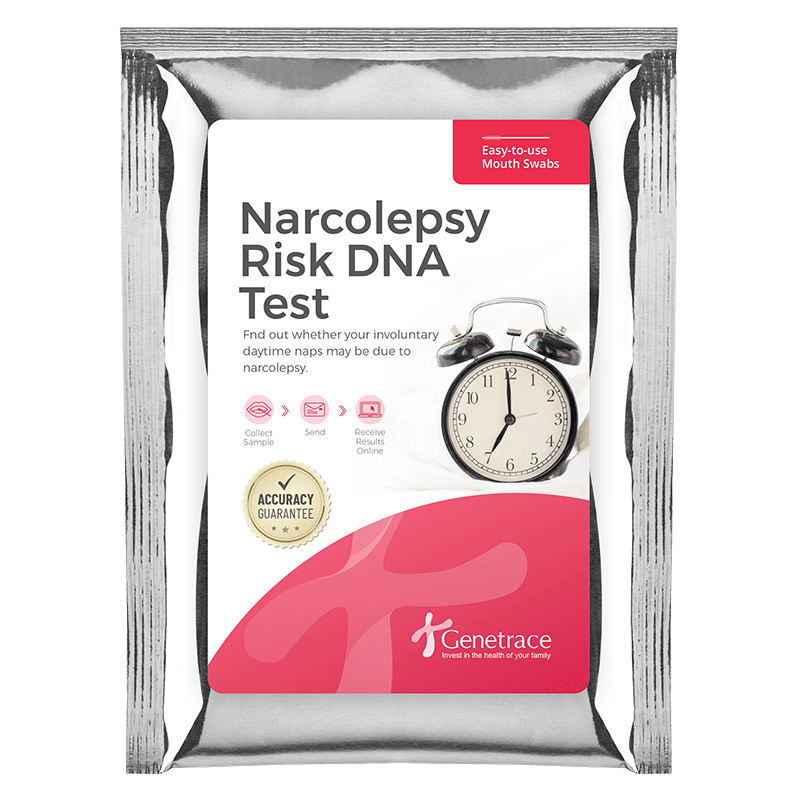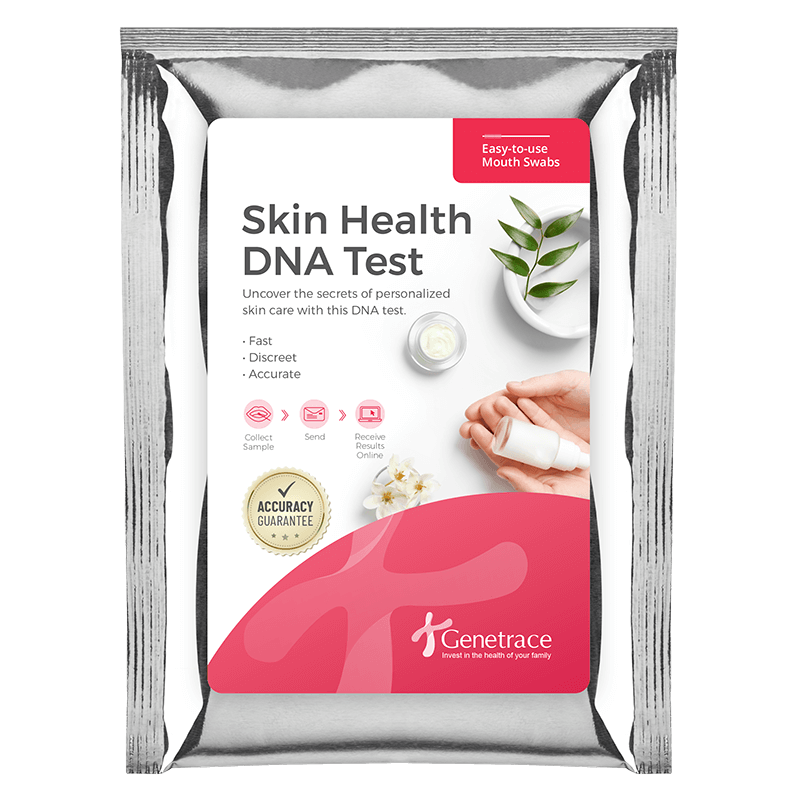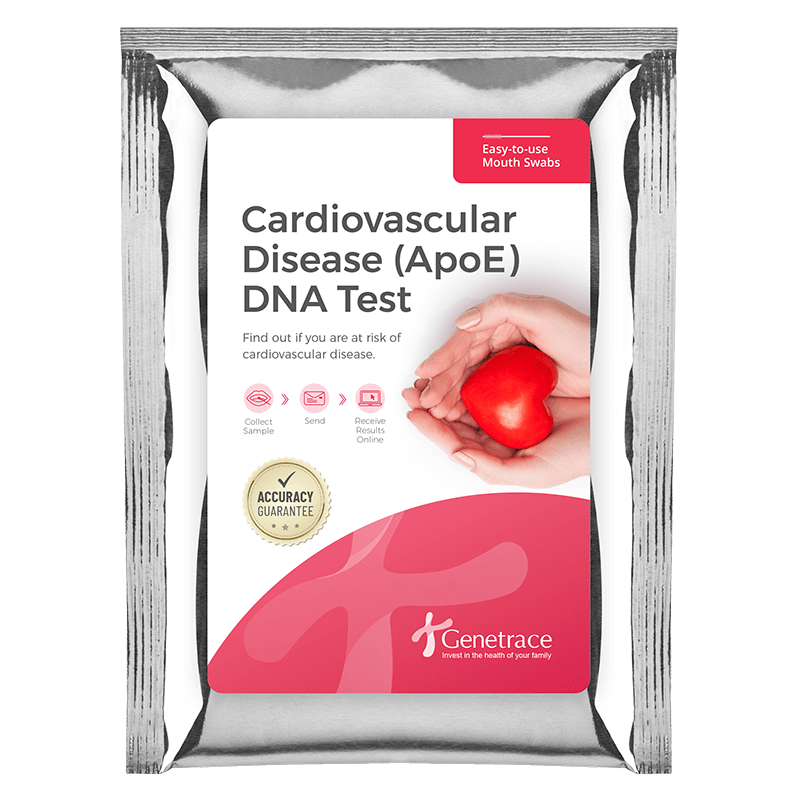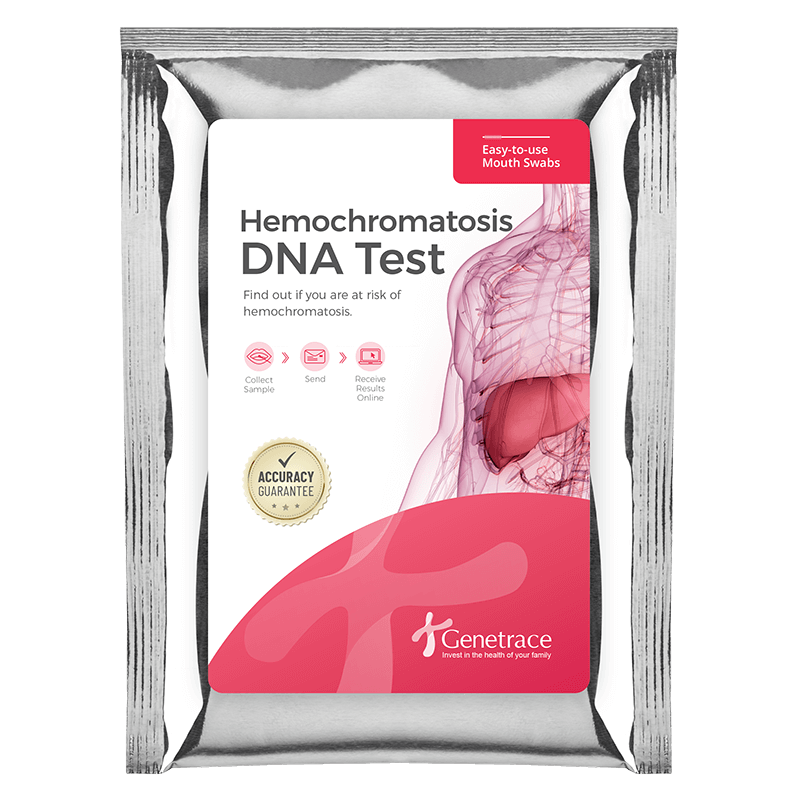Narcolepsy Risk DNA Test
$195.00
Discover your genetic predisposition to narcolepsy with the DNA Narcolepsy Test. This test focuses on the HLA-DQB1*06:02 genotyping, a gene variant associated with an increased risk of developing narcolepsy. This test is particularly useful for those with a family history of narcolepsy or unexplained excessive daytime sleepiness
- Free shipping both ways
- Easy-to-use cheek swabs
- AABB, ISO17025 & CLIA accredited lab
Kit includes all lab fees and free return shipping to the lab.
Receive secure, confidential results through your online dashboard.
All tests performed in our AABB, ISO 17025 & CLIA accredited laboratory.
Understanding the DNA Narcolepsy Test
This at-home DNA test kit will conclusively determine whether you carry the HLA-DQB1*06:02 genetic variant associated with an increased lifetime risk of developing narcolepsy.
The HLA-DQB1 Gene
The HLA-DQB1 gene is part of the extensive HLA gene family, which includes over 200 genes. These HLA genes are bunched together on chromosome 6 and create parts of the human leukocyte antigen (HLA) complex. This complex is vital for your immune system. It recognizes the proteins that belong to your body and the foreign ones from viruses and bacteria. The HLA-DQB1 gene creates a protein that pairs up with another protein from the HLA-DQA1 gene to show foreign proteins to the immune system. This triggers your body’s defense against these invaders.
Exploring Variations in the HLA-DQB1 Gene
HLA genes differ greatly between individuals. Researchers have discovered several hundred variations (or alleles) of the HLA-DQB1 gene. Each allele is assigned a specific number like HLA-DQB106:02. Certain HLA-DQB1 alleles are linked to various health conditions. For example, the DQB103:02, when paired with DQA103:01 or DQA103:02, raises the risk of celiac disease.
The DQB106:02 allele is particularly significant for narcolepsy risk. It is found in 90-99% of people with narcolepsy. Those who carry two copies of the DQB106:02 allele have an even higher risk than those with one copy. However, the presence of this allele alone isn’t enough to cause health issues, as many people (15-25% of the population) carry this allele but never develop narcolepsy. This suggests that other genetic and environmental factors are involved in narcolepsy’s onset.
Another allele linked to narcolepsy is DQB103:01, but it doesn’t raise the risk as much as DQB106:02. Researchers have also found protective alleles in various populations, including DQB105:01, DQB106:01, DQB106:03, DQB102, and DQB1*06:09. The DQA1 alleles, which create the other part of the DQA1 – DQB1 complex, might also influence risk.
What Is Narcolepsy?
Narcolepsy is a condition that leads to intense daytime sleepiness and sudden, temporary muscle weakness, a phenomenon known as cataplexy. It’s a standalone condition not linked to other diseases or mental health issues.
Narcolepsy impacts between 1 in 2000 and 1 in 5000 people. However, only about 25% of those affected are accurately diagnosed, with many wrongly diagnosed with psychiatric or emotional problems.
What Causes Narcolepsy?
While most narcolepsy cases appear randomly, genetics play a significant role. Relatives of someone with narcolepsy have a 20 – 40 times higher risk of developing the condition. The HLA-DQB1 gene variant is strongly linked to narcolepsy, found in 90-99% of individuals with the condition. Yet, other factors must be involved, as this gene variant is also present in about 15% of the unaffected population.
Many people with narcolepsy experience cataplexy. A deficiency in the neurotransmitter hypocretin is common among these individuals. There is currently no clear genetic mutation identified as the cause, which suggests that narcolepsy may be an autoimmune disease. Other evidence supporting this includes the presence of auto-antibodies near the disease’s onset and an increase in new cases following the 2009 H1N1 influenza vaccination.
Narcolepsy likely also has environmental triggers, potentially including infections, trauma, hormonal changes, stress, or immune system issues.
Age Limit None. This test can be taken at any age.
Collection Method Buccal swabs. The test kit contains buccal swabs and instructions for collecting a buccal swab sample from inside the mouth.
Testing Time: 4-6 weeks
Testing Methodology Sequence Based Typing (SBT)
Sample Handling DNA test kits do not have an expiry date and can be used at any time. Once the DNA sample is collected, it must be returned to the laboratory for testing within three months of collection. No refrigeration is required. Store at room temperature.
Limitations It is important to remember that the presence of the HLA-DQB1*06:02 allele does not mean that an individual will definitely develop narcolepsy. The HLA-DQB1*06:02 allele does increase the risk but there are many individuals that have this allele and never develop narcolepsy. There are also people that do not have the HLA-DQB1*06:02 allele who develop the disease. Alleles other than HLA-DQB1*06:02 allele will not be identified. An increased risk of narcolepsy and an accurate diagnosis are also dependent on a variety of genetic and non-genetic factors that are not detected by this assay.
Summary
Understanding the DNA Narcolepsy Test
This at-home DNA test kit will conclusively determine whether you carry the HLA-DQB1*06:02 genetic variant associated with an increased lifetime risk of developing narcolepsy.
The HLA-DQB1 Gene
The HLA-DQB1 gene is part of the extensive HLA gene family, which includes over 200 genes. These HLA genes are bunched together on chromosome 6 and create parts of the human leukocyte antigen (HLA) complex. This complex is vital for your immune system. It recognizes the proteins that belong to your body and the foreign ones from viruses and bacteria. The HLA-DQB1 gene creates a protein that pairs up with another protein from the HLA-DQA1 gene to show foreign proteins to the immune system. This triggers your body’s defense against these invaders.
Exploring Variations in the HLA-DQB1 Gene
HLA genes differ greatly between individuals. Researchers have discovered several hundred variations (or alleles) of the HLA-DQB1 gene. Each allele is assigned a specific number like HLA-DQB106:02. Certain HLA-DQB1 alleles are linked to various health conditions. For example, the DQB103:02, when paired with DQA103:01 or DQA103:02, raises the risk of celiac disease.
The DQB106:02 allele is particularly significant for narcolepsy risk. It is found in 90-99% of people with narcolepsy. Those who carry two copies of the DQB106:02 allele have an even higher risk than those with one copy. However, the presence of this allele alone isn’t enough to cause health issues, as many people (15-25% of the population) carry this allele but never develop narcolepsy. This suggests that other genetic and environmental factors are involved in narcolepsy’s onset.
Another allele linked to narcolepsy is DQB103:01, but it doesn’t raise the risk as much as DQB106:02. Researchers have also found protective alleles in various populations, including DQB105:01, DQB106:01, DQB106:03, DQB102, and DQB1*06:09. The DQA1 alleles, which create the other part of the DQA1 – DQB1 complex, might also influence risk.
What's Measured?
What Is Narcolepsy?
Narcolepsy is a condition that leads to intense daytime sleepiness and sudden, temporary muscle weakness, a phenomenon known as cataplexy. It’s a standalone condition not linked to other diseases or mental health issues.
Narcolepsy impacts between 1 in 2000 and 1 in 5000 people. However, only about 25% of those affected are accurately diagnosed, with many wrongly diagnosed with psychiatric or emotional problems.
What Causes Narcolepsy?
While most narcolepsy cases appear randomly, genetics play a significant role. Relatives of someone with narcolepsy have a 20 – 40 times higher risk of developing the condition. The HLA-DQB1 gene variant is strongly linked to narcolepsy, found in 90-99% of individuals with the condition. Yet, other factors must be involved, as this gene variant is also present in about 15% of the unaffected population.
Many people with narcolepsy experience cataplexy. A deficiency in the neurotransmitter hypocretin is common among these individuals. There is currently no clear genetic mutation identified as the cause, which suggests that narcolepsy may be an autoimmune disease. Other evidence supporting this includes the presence of auto-antibodies near the disease’s onset and an increase in new cases following the 2009 H1N1 influenza vaccination.
Narcolepsy likely also has environmental triggers, potentially including infections, trauma, hormonal changes, stress, or immune system issues.
Technical Information
Age Limit None. This test can be taken at any age.
Collection Method Buccal swabs. The test kit contains buccal swabs and instructions for collecting a buccal swab sample from inside the mouth.
Testing Time: 4-6 weeks
Testing Methodology Sequence Based Typing (SBT)
Sample Handling DNA test kits do not have an expiry date and can be used at any time. Once the DNA sample is collected, it must be returned to the laboratory for testing within three months of collection. No refrigeration is required. Store at room temperature.
Limitations It is important to remember that the presence of the HLA-DQB1*06:02 allele does not mean that an individual will definitely develop narcolepsy. The HLA-DQB1*06:02 allele does increase the risk but there are many individuals that have this allele and never develop narcolepsy. There are also people that do not have the HLA-DQB1*06:02 allele who develop the disease. Alleles other than HLA-DQB1*06:02 allele will not be identified. An increased risk of narcolepsy and an accurate diagnosis are also dependent on a variety of genetic and non-genetic factors that are not detected by this assay.
Explore your DNA Story
Embark on a journey of self-discovery with our at-home DNA tests, powered by cutting-edge science made accessible for all.
Simple Sample Collection
Secure Online Results
Accredited Laboratory
Discreet & Confidential
How it works
Purchase your kit
Collect DNA Sample
Mail samples to the lab
Receive your results
FAQ's
Here are the answers to the most frequently asked questions about this test.
Yes, family members of an affected individual have a 20- to 40-fold increased risk of narcolepsy.
No, not everyone who carries one or more copies of the HLA-DQB1*06:02 allele will suffer from narcolepsy. However, research has shown that people who carry the HLA-DQB1*06:02 allele have up to a 251-fold increased risk of developing narcolepsy.
90-99% of people (99% of Caucasians) affected with narcolepsy and cataplexy have the HLA-DQB1*06:02 allele.









